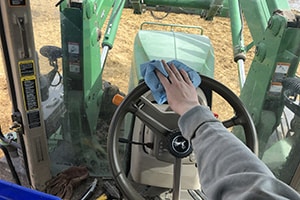JUNE 2020

Standard operating procedures should include frequent cleaning of high-touch surfaces, especially in equipment run by more than one person or in shared spaces. (NDSU photo)
During this time of the COVID-19 pandemic, there seems to be an abundance of resources and guidelines to inform the public. All of this information can be overwhelming when trying to do the “right thing.”
To help farmers, families and workers put the guidelines in place, UMASH has focused on developing practical tips and solutions by working with our partners in the Upper Midwest.
One such partner is North Dakota State University (NDSU) Extension. Katelyn Hain and Angie Johnson, both NDSU Extension agriculture and natural resources agents, wrote a recent article in which they suggest farmers develop Standard Operating Procedures (SOPs), safety steps that a farm creates so that everyone stays safe. They have shared their information to help farmers protect themselves and their business from COVID-19.
Read the news release below for suggestions on how to do the “right thing” to keep you and your farm safe.
Develop Standard Operating Procedures to Encourage Farm Safety
Katelyn Hain and Angie Johnson
North Dakota State University (NDSU) Extension
The coronavirus pandemic has highlighted the importance of risk prevention measures through universal protocols in everyday life, especially in situations of high risk.
“Farmers and ranchers should take everyday steps to protect their employees, just as businesses take steps to protect customers and employees,”
In instances such as COVID-19, reducing the chance of transmission is critical in protecting all employees, but especially individuals who may be considered at high risk of developing illness or live with individuals who are at risk.
“Communicating expectations and having procedures in place helps all employees know what is expected of them and creates an environment that emphasizes worker safety and well-being,” Hain adds. “This is important in situations where there may be a higher risk of disease transmission such as COVID-19, but developing standard operating procedures is a proactive measure for everyday prevention of farm accidents and other biosecurity risks. While you cannot completely mitigate risk, you can take precautions to help lower risk.”
A standard operating procedure that carries beyond a pandemic is frequent cleaning of high-touch surfaces, especially in equipment that is run by more than one person or in shared spaces. Surfaces also should be disinfected in instances of higher disease transmission such as COVID-19.
High-touch surfaces in and on vehicles and tractors include:
- Door handles (inside and out)
- Steering wheels
- Keys
- Gear controls
- Center consoles
- Radio knobs
- Other control panel buttons
- Glove boxes
- Seatbelts
High-touch surfaces in shops and other farm buildings include:
- Door handles and control buttons
- Light switches
- Bathroom surfaces
- Shared tools
- Common meeting areas for employees (table and chairs)
- Kitchenettes (refrigerator door handles, cupboard handles, coffee pot, etc.)
To clean these surfaces, use warm water and soap and a microfiber cloth to remove dust, dirt and grime particles. Rinse with clean water after washing to remove soap residue, which could attract dust.
Be careful when using soap and water near electrical equipment, such as touchscreen monitors. Electrical equipment is sensitive to moisture, especially along monitor edges. Alcohol wipes may be a better option for some screens. Refer to your tractor or vehicle owner’s manual for proper cleaning procedures for electrical units and touchscreen monitors.
Once the dirt, dust and grime is removed, use a household disinfectant to kill bacteria and viruses on the surfaces. Do not use bleach or hydrogen peroxide-based disinfectants in your tractor and vehicle interiors because they can damage upholstery.
Touchscreen monitors should not be disinfected with ammonia-based disinfectants because ammonia can damage the anti-glare and anti-fingerprint coatings.
“After you have cleaned and disinfected high-touch surface areas, wash your hands,” advises Angie Johnson, NDSU Extension’s agriculture and natural resources agent in Steele County. “Also, get into the habit of washing your hands before you enter and after you exit your tractor and vehicle.”
The agents recommend producers encourage everyone on the farm to wash their hands and use hand sanitizers when washing is not an option. Stock the farm shop’s wash station with soap and disposable towels, and provide hand sanitizer for employees to carry. Also clean workspaces often, and supply a garbage bag to throw away contaminated materials, such as gloves or wipes that workers can remove easily at the end of each shift or task.
In addition, create a cleaning and sanitizing record sheet. Producers and employees can record the date, time, equipment or tools and how they cleaned or sanitized the items. Keep this paper record in a binder in a high-traffic area in the shop.
Place stickers inside equipment to remind operators to wipe the steering wheel, key/ignition switch, gear shifter. Placing stickers inside equipment to remind operators to wipe the steering wheel, key/ignition switch, gear shift, door handles, radio and climate control knobs, etc. before exiting the equipment also can be helpful, the agents say.
- Visit NDSU’s Farm Safety website at: ag.ndsu.edu/extension/farmsafety
- For more COVID-19 resoures, visit: umash.umn.edu/covid-19-resources
This story was re-published with permission. View the original story from NDSU at:
ag.ndsu.edu/news/newsreleases/2020/june-8-2020/develop-standard-operating-procedures-to-encourage-farm-safety
